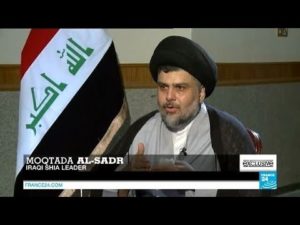 Many Shiite armed factions in Iraq haven’t been threatening the United States of late, especially since they fared so well in the May 12 elections, receiving the second-most number of parliament seats. The shift indicates a possible rapprochement between the two sides, albeit undeclared, Mustafa Saadoun writes for Al-Monitor:
Many Shiite armed factions in Iraq haven’t been threatening the United States of late, especially since they fared so well in the May 12 elections, receiving the second-most number of parliament seats. The shift indicates a possible rapprochement between the two sides, albeit undeclared, Mustafa Saadoun writes for Al-Monitor:
Some militias of the Iran-backed, mostly Shiite, Popular Mobilization Units (PMU) in Iraq seem to be working to end the hostility toward Washington. Some indication of this was seen during the recent International Quds Day protests, which were organized by armed Shiite factions close to Iran in the Iraqi capital of Baghdad. The rallies were held June 8, marking the last Friday in the holy month of Ramadan, to show support for the Palestinian struggle against the Israeli occupation. The Quds Day protests are an annual tradition that started in 1979 by  Ayatollah Ruhollah Khomeini, the late leader of the Islamic Revolution.
Ayatollah Ruhollah Khomeini, the late leader of the Islamic Revolution.
The United States doesn’t deal with the PMU as a whole institution, but rather with each faction separately. The United States is closest to Amiri, who in addition to leading the Fatah Alliance also heads the Badr Organization. “Amiri has been in contact with the United States via ongoing meetings in Baghdad,” said Rahman Aljebouri, a senior researcher at the National Endowment for Democracy.
“Both the United States and the factions that seek rapprochement will benefit from such a step. Washington, however, views the factions that have joined the political process and have a long political history to be the closest to it,” Aljebouri told Al-Monitor.
“The relations between the Badr Organization and the Americans have evolved through the ministries of Transport and Interior, which were [part of] Amiri’s party,” he added.







